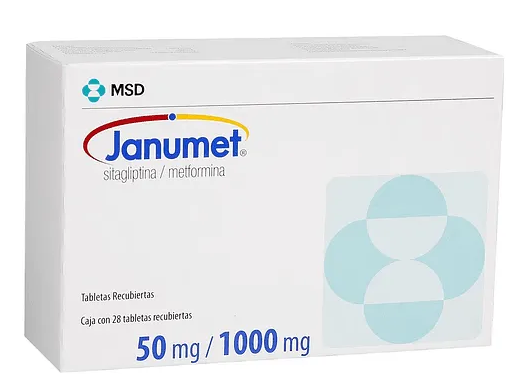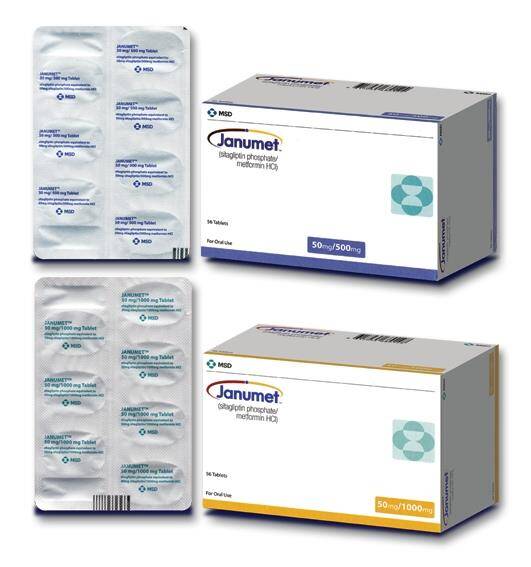Janumet (Sitagliptin-Metformin)











Dosages
Janumet 50 mg/500 mg
| Quantity | Price per pill | Total price | |
|---|---|---|---|
| 28 | $1.21 | $34.00 | |
| 56 | $1.20 | $67.00 | |
| 84 | $1.20 | $101.00 | |
| 112 | $1.20 | $134.00 | |
| 182 | $1.20 | $218.00 |
Janumet 50 mg/1000 mg
| Quantity | Price per pill | Total price | |
|---|---|---|---|
| 28 | $1.43 | $40.00 | |
| 56 | $1.43 | $80.00 | |
| 84 | $1.42 | $119.00 | |
| 112 | $1.42 | $159.00 | |
| 182 | $1.42 | $258.00 |
Payment & Shipping
Your order is securely packed and usually ships within 24 hours. Here's what a typical package looks like.
It is about the size of a regular letter (9.4x4.3x0.3 inches) and shows no details about what is inside.



| Shipping Method | Estimated delivery |
|---|---|
| Express Free for orders over $300.00 | Estimated delivery to the U.S.: 4-7 days |
| Standard Free for orders over $200.00 | Estimated delivery to the U.S.: 14-21 days |









Discount Coupons
- Independence Day - July 4, 2025 10% JULY410
- Labor Day - September 1, 2025 7% LABOR07
- Thanksgiving - November 27, 2025 9% THANKS09
Brand Names
| Manufacturer | Brand Names |
|---|---|
| MSD Pharmaceuticals Pvt. Ltd. | - |
FAQ
Description
What Is Janumet (Sitagliptin + Metformin)?
Janumet is a medication that combines two active ingredients, sitagliptin and metformin, to help manage blood sugar levels in people with type 2 diabetes. Sitagliptin belongs to a class of drugs called dipeptidyl peptidase-4 (DPP-4) inhibitors, which increase the levels of incretin hormones in the body. These hormones help regulate insulin and reduce the amount of glucose the liver produces. Metformin, on the other hand, is a biguanide that improves the body's response to insulin and lowers the amount of glucose the liver produces. By combining these two medications, Janumet provides a dual mechanism of action to effectively control blood sugar levels in individuals with type 2 diabetes.
NDC Codes: 0006-0575-01, 0006-0575-02, 0006-0575-03, 0006-0575-52, 0006-0575-56, 0006-0575-61, 0006-0575-62, 0006-0575-82, 0006-0577-01, 0006-0577-02, 0006-0577-03, 0006-0577-52, 0006-0577-56, 0006-0577-61, 0006-0577-62, 0006-0577-82; 50090-5616-0, 50090-5616-1, 50090-5618-0, 50090-5503-0, 50090-5502-0, 50090-5502-1, 50090-5504-0, 50090-5504-1, 50090-6244-0, 50090-4411-0, 50090-4411-1.

Ingredients
Janumet combines two active ingredients: sitagliptin and metformin. Sitagliptin is a dipeptidyl peptidase-4 (DPP-4) inhibitor, while metformin is a biguanide. In addition to the active ingredients, Janumet tablets also contain various inactive ingredients, such as microcrystalline cellulose, polyvinylpyrrolidone, sodium lauryl sulfate, and magnesium stearate. These inactive ingredients help in the formulation and stability of the medication. It's essential for individuals using Janumet to be aware of the complete list of ingredients, primarily if they have known allergies or sensitivities to certain substances. Always consult a healthcare professional for comprehensive information regarding the medication and its components.
Who Can Take Janumet (Sitagliptin + Metformin)
Janumet, which combines sitagliptin and metformin, is typically prescribed for adults with type 2 diabetes. It's intended for individuals whose blood sugar levels must be adequately controlled by diet and exercise alone. This medication may be suitable for people who require both a DPP-4 inhibitor (sitagliptin) and metformin to manage their diabetes effectively.
However, not everyone is a candidate for Janumet. Individuals with certain medical conditions, such as kidney problems, liver disease, or a history of pancreatitis, may need adjustments in their treatment plan or should avoid Janumet altogether. Pregnant or breastfeeding individuals should also consult with their healthcare provider before using this medication.
Ultimately, the decision to prescribe Janumet and its suitability for an individual depends on various factors, and it should be determined by a healthcare professional based on a thorough evaluation of the person's medical history and overall health.
Dosage Sizes
The dosage of Janumet (Sitagliptin + Metformin) can vary based on individual factors, and it's essential to follow the prescribed dosage provided by a healthcare professional. Janumet is available in different strengths, typically combining varying amounts of sitagliptin and metformin. Common dosage strengths include 50 mg sitagliptin with 500 mg, 850 mg, or 1000 mg metformin.
For example, a standard dosage might be Janumet 50 mg/1000 mg, indicating 50 mg of sitagliptin and 1000 mg of metformin in a single tablet.
Dosage adjustments may be made based on the individual's response to the medication, kidney function, and other factors. Individuals must take the medication exactly as prescribed and not adjust the dosage without consulting their healthcare provider. Regular monitoring of blood sugar levels and follow-up appointments with a healthcare professional are essential to ensure the medication is effectively managing diabetes while minimizing potential side effects.
Important Safety Information
Individuals should seek medical attention if they experience signs of an allergic reaction, such as rash, itching, or swelling, especially of the face, lips, or tongue.
Metformin, one of the components of Janumet, may increase the risk of a rare but serious condition called lactic acidosis. This risk is higher in individuals with kidney problems or other conditions. Symptoms may include muscle pain, difficulty breathing, stomach pain with nausea, and unusual tiredness. Prompt medical attention is necessary if these symptoms occur.
Regular monitoring of kidney function is essential, as metformin can affect the kidneys. Individuals with impaired kidney function may require dosage adjustments or should avoid Janumet.
There have been reports of inflammation of the pancreas (pancreatitis) with the use of Janumet. Individuals should seek medical attention if they experience persistent severe abdominal pain.
The combination of sitagliptin and metformin may increase the risk of hypoglycemia, mainly when used with other medications that lower blood sugar. Individuals should be educated on the symptoms of low blood sugar and how to manage it.
Before starting Janumet, individuals should inform their healthcare provider of their medical history, especially if they have kidney problems, liver disease, or a history of pancreatitis. It's also essential to communicate all medications, including over-the-counter and herbal supplements.
Individuals should follow their healthcare provider's instructions, attend regular check-ups, and promptly report any unusual symptoms or side effects.

Contraindications
Certain conditions may contraindicate the use of Janumet (sitagliptin + metformin). Here are some contraindications to consider:
- Severe Renal Impairment: Janumet should not be used in individuals with severe renal impairment or end-stage renal disease, as the kidneys excrete metformin, and its accumulation can increase the risk of lactic acidosis.
- Hypersensitivity: Individuals with a known hypersensitivity to sitagliptin, metformin, or any inactive ingredients in Janumet should avoid its use.
- Acute or Chronic Metabolic Acidosis: Janumet is contraindicated in individuals with conditions that may cause metabolic acidosis, such as uncontrolled diabetes with ketoacidosis or lactic acidosis.
- Severe Hepatic Impairment: Janumet is not recommended in individuals with severe hepatic impairment, as the safety and effectiveness of the medication in this population have not been established.
- Pancreatitis: Individuals with a history of pancreatitis should avoid Janumet, as there have been reports of pancreatitis associated with its use.
Individuals must provide a comprehensive medical history to their healthcare provider before starting Janumet, and healthcare professionals will assess the potential risks and benefits based on individual health conditions. If there are contraindications, alternative treatment options may be considered. Always follow a healthcare professional's advice and guidance regarding using Janumet.
Interactions
Janumet (sitagliptin + metformin) may interact with other medications, potentially affecting their effectiveness or increasing the risk of side effects. Here are some common drug interactions to be aware of:
- Insulin or Insulin-Secretagogues: The risk of hypoglycemia (low blood sugar) may increase when Janumet is combined with insulin or insulin-secretagogues (e.g., sulfonylureas). Dosage adjustments may be necessary to avoid low blood sugar.
- Diuretics: Some diuretics (water pills) can lead to dehydration, which may increase the risk of lactic acidosis when used with metformin. Close monitoring of kidney function is essential when Janumet is used with diuretics.
- Certain Antihypertensive Medications: Concomitant use of Janumet with angiotensin-converting enzyme (ACE) inhibitors or angiotensin II receptor blockers (ARBs) may increase the risk of hypotension (low blood pressure).
- Cationic Drugs: Janumet may interact with cationic drugs eliminated by renal tubular secretion. Concurrent use may increase the concentration of these drugs in the blood, potentially leading to toxicity.
- Iodinated Contrast Materials: Janumet should be temporarily discontinued before or at the time of iodinated contrast material administration for radiologic studies, as metformin can increase the risk of lactic acidosis in the presence of renal dysfunction.
Before starting Janumet, individuals must inform their healthcare provider about all medications, including prescription, over-the-counter, and herbal supplements. This allows the healthcare professional to assess potential interactions and make informed decisions about the treatment plan. Adjustments to medication regimens may be necessary to ensure the safe and effective use of Janumet.
Side Effects
Like any medication, Janumet (Sitagliptin + Metformin) can cause side effects. Common side effects may include upper respiratory tract infections, diarrhea, nausea, and headaches. These side effects are usually mild and may improve over time.
However, there are more severe side effects that require prompt medical attention. These can include:
- Lactic Acidosis: Although rare, metformin, one of the components of Janumet, can cause a serious condition called lactic acidosis. Symptoms may include muscle pain, difficulty breathing, stomach pain with nausea, and unusual tiredness. If any of these symptoms occur, medical attention should be sought immediately.
- Pancreatitis: There have been reports of inflammation of the pancreas (pancreatitis) associated with using Janumet. Symptoms may include persistent severe abdominal pain, sometimes radiating to the back. Immediate medical attention is necessary if these symptoms occur.
- Hypersensitivity Reactions: Allergic reactions to Janumet, including rash, itching, and swelling, can occur. If any signs of hypersensitivity occur, medical attention should be sought.
It's essential for individuals to be aware of these potential side effects and to report any unusual symptoms to their healthcare provider promptly. Additionally, individuals should attend regular check-ups to monitor for any changes in health and ensure that the medication effectively manages diabetes. Always follow the prescribed dosage and guidelines provided by a healthcare professional.
Overdose
In case of an overdose of Janumet (Sitagliptin+ Metformin), immediate medical attention is essential. Overdose symptoms may include severe hypoglycemia (low blood sugar), which can lead to unconsciousness or seizures.
If an individual suspects an overdose or experiences symptoms such as extreme weakness, confusion, tremors, sweating, fast heart rate, or fainting, it's crucial to seek emergency medical attention or contact a poison control center.
Treatment for Janumet overdose may involve supportive measures to stabilize blood sugar levels. This can include administration of glucose or intravenous fluids. Since the kidneys primarily excrete metformin, kidney function will also be closely monitored.
Individuals need to take Janumet precisely as prescribed by their healthcare provider to minimize the risk of overdose. If a dose is missed or if there are concerns about the medication, it's advisable to consult with a healthcare professional for guidance. Never adjust the dosage or stop taking Janumet without medical supervision.
Storage
Store Janumet at room temperature, away from extreme heat or cold. Avoid exposure to temperatures above 86°F (30°C) and below 32°F (0°C).
Keep Janumet in its original tightly closed container to protect it from moisture. Avoid storing the medication in bathrooms or other humid environments.
Store Janumet away from direct sunlight and intense artificial light. Keeping the medication in its original packaging is best to protect it from light exposure.
Keep Janumet out of reach of children and pets. Consider storing it in a locked cabinet or another secure location.
Dispose of expired or unused medication properly. Follow local medication disposal guidelines or consult a pharmacist for advice on safe disposal.
Following proper storage practices helps maintain the medication's stability and ensures its safety and efficacy.
Drugs Similar to Janumet (Sitagliptin + Metformin)
Janumet (Sitagliptin + Metformin) is a combination medication with two active ingredients: sitagliptin and metformin. If you're looking for alternatives or generic versions, it's essential to consider each component separately.
- Sitagliptin: It is available as a standalone medication under the brand name Januvia. It is a dipeptidyl peptidase-4 (DPP-4) inhibitor used to improve blood sugar control in individuals with type 2 diabetes.
- Metformin: It is a widely used medication available under various brand names and as a generic. Some common brand names for metformin include Glucophage, Glumetza, and Fortamet. Generic versions are also widely available.
It's important to note that while alternative medications have similar mechanisms of action, the specific combination of sitagliptin and metformin in Janumet may have unique advantages or considerations. Before making any changes to your medication, consult with your healthcare provider. They can guide suitable alternatives based on your health needs and treatment response.
FAQ
Can Janumet be used alone, or is it always prescribed in combination with other medications?
Janumet is a combination medication containing sitagliptin and metformin. While these components can be prescribed separately, Janumet is specifically formulated to provide a dual mechanism of action for managing type 2 diabetes.
Is Janumet suitable for individuals with a history of pancreatitis?
Individuals with a history of pancreatitis should avoid Janumet, as there have been reports of pancreatitis associated with its use.
Can Janumet be taken during pregnancy?
Pregnant individuals should consult their healthcare provider before using Janumet, as the safety of the medication during pregnancy is not well established.
Are there dietary restrictions while taking Janumet?
While there are no specific dietary restrictions, following a healthy diet and exercise regimen is essential for overall diabetes management. Consult with a healthcare provider or a registered dietitian for personalized advice.
Can Janumet cause weight gain?
Weight changes can occur with diabetes medications, but Janumet is not generally associated with significant weight gain. Individual responses may vary.
Is Janumet suitable for elderly individuals with diabetes?
Janumet can be prescribed for elderly individuals, but dosage adjustments may be necessary based on individual health conditions. Consult a healthcare provider for personalized recommendations.
Can Janumet be crushed or split for easier administration?
Janumet tablets should be taken whole. Crushing or splitting the tablets may alter their effectiveness or release the medication too quickly.
How often should kidney function be monitored while taking Janumet?
Regular monitoring of kidney function is essential, especially in individuals with pre-existing kidney conditions. The healthcare provider will determine the appropriate frequency of monitoring.
Can Janumet be used in individuals with both diabetes and cardiovascular disease?
Janumet may be suitable for individuals with diabetes and cardiovascular disease, but a healthcare provider must consider individual health factors.












